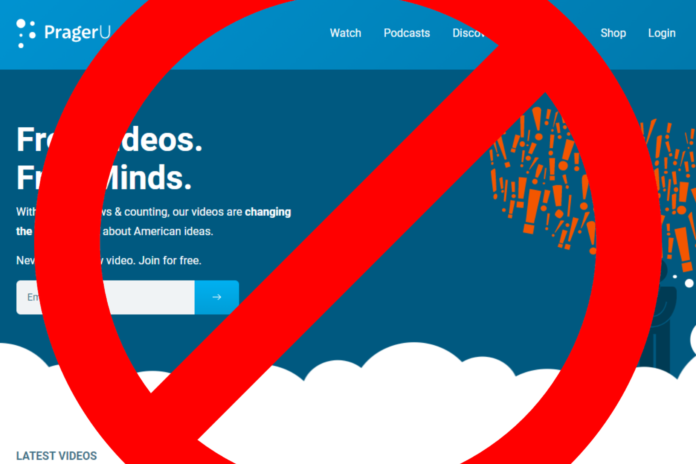While news consumers understand that social media platforms like Facebook or YouTube can deplatform outlets and individuals, fewer people understand that there’s a network of equally important and increasingly politicized backend services that can do the same thing.
“We just got kicked off of the site that hosted our site, it’s called JW Player,” PragerU cofounder Allen Estrin told Alpha News in a recent episode of Alpha News Live.
The implications of this ban are huge. PragerU has amassed over five billion video views across all platforms since its inception. However, as content regulators at social media services continue to apply censorial pressure to the organization, PragerU has increasingly relied on its own site to spread its message. JW Player’s recent decision threatened to remove even that ability.
“They just said, ‘sorry, you don’t meet our community standards.’ They didn’t say what those standards were, they just said, ‘we don’t want your business,'” Estrin explained.
JW Player reportedly justified its decision based on the findings of a third-party service run by journalists who were hired to decide if PragerU deserved to stay online. “We finally found out, after really pressing them, they said, ‘well, we have third-party groups that investigated your material and they found it wanting and they advised us, essentially, that you weren’t meeting the standards,'” Estrin told Alpha News.
The PragerU cofounder noted how odd it is that massive businesses like JW Player would hire a third party to tell them how to follow their own rules. “It’s all essentially one entity, they just make a show of it,” he concluded.
This relationship between JW Player and a third-party organization that determines the acceptability of content is not unique. The Southern Poverty Law Center (SPLC), the American Civil Liberties Union (ACLU), the Anti-Defamation League (ADL) and similar groups all boast of using their public and political influence to pressure online services into censoring certain types of content.
While PragerU had enough resources and is noncontroversial enough to find a new video hosting service, many organizations are not so lucky.
Twitter alternative Parler was removed from the internet for several months after every vendor the company used to keep the site online decided to boycott at the same time. This included Amazon Web Services, which barred Parler in a move that Time Magazine said may be pivotal for “the future of the internet.” The reason for this is that smaller companies often follow in the footsteps of the online giants. After Amazon’s denial of service, at least six other major providers declined to host Parler.
Financial institutions have also opened up a new front in the fight against online conservatives with Gab being among the hardest hit. Similar to Parler, Gab aims to provide an unrestricted social media experience, but this mission has been complicated as the website has been effectively banned from banking, forcing it to adopt cryptocurrency for business transactions.

Businesses involved in former President Donald Trump’s various enterprises and even individual commentators have also been booted from banks and financial tools, including PayPal, Stripe, CoinDesk (a cryptocurrency brokerage), Squarespace, Shopify, Visa-owned services and more based on their political beliefs.
Meanwhile, the mainstream media backed by the ADL, SPLC, and ACLU cheer this on as part of the fight against hate. “Across the internet, a game of whack-a-mole is underway to root out extremism,” wrote NPR, reporting on the deplatforming and de-banking of individual content creators like Nick Fuentes.
NBC reported that financial services and backend web services did “too little, too late” to fight “extremism” after Trump’s campaign website was barred from accessing the tools it uses to take payments.
Estrin predicts that these backend tech vendors will continue to cave to social pressure because they can easily afford to do so. “It’s not going to affect their stock price, their bottom line is not going to be materially affected,” he observed.

















